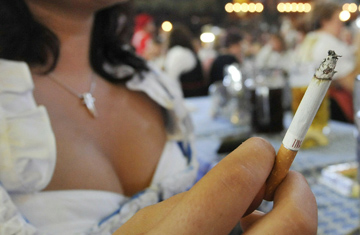
A woman in traditional Bavarian clothes smokes at the Oktoberfest beer festival in Munich
Visitors to Munich's world-famous Oktoberfest beer festival will soon be in for a nasty surprise if they decide to spark up a smoke to go with that ale — starting next year, they could face a hefty fine. The city's fun-loving residents have voted in favor of a draconian new smoking ban that applies throughout the south German state of Bavaria. And the move has prompted calls for a new blanket ban on smoking across the whole of the country.
In a referendum held on July 4, 61% of voters in Bavaria supported the ban. Under the new rules, from Aug. 1 smoking will be prohibited in all bars, cafés and restaurants — and, from 2011, in the beer tents at the popular Oktoberfest.
Bavaria has been there before: the state used to have some of the toughest smoking laws in Germany until lobbying from the tobacco industry and complaints from voters pushed the regional government to ease the restrictions last year, allowing smokers to light up in small one-room bars and in large restaurants with a separate smokers' room. "The authorities didn't bother enforcing the partial smoking ban and people ended up smoking wherever they liked," says Sebastian Frankenberger, the 28-year-old antismoking campaigner who initiated the referendum. "It's clear that Bavarians want a smoke-free environment — health and youth protection should take precedence over the tobacco lobby."
The new Bavarian law imposes the toughest restrictions on smoking in Germany — and has left bar owners fuming. Some Bavarian pubs and restaurants that have tolerated smoking up until now complain that they'll be hit hard by the new rules and could face bankruptcy. "Small bars, especially country pubs, won't survive and many bars and restaurants will lose customers," says Monika Poschenrieder, head of the local hotel and restaurant association in the Bavarian spa town of Bad Tölz. "Smokers should have the right to light up in a separate room instead of being banished outside — that's really tough in the cold winter," she says. The Bavarian hotel and restaurant association warns the smoking ban will hurt profits, leading to a 30% drop in turnover.
Following the vote in Bavaria, politicians in Berlin have appealed for a nationwide smoking ban. "There's a complete mess of different contradictory smoking laws in Germany," says Karl Lauterbach, health spokesman for junior coalition partner the Social Democratic Party. "If you want a smoking ban then you need to impose a strict nationwide ban, like the ban in Bavaria, which has no exceptions," he says.
Lauterbach says there is growing cross-party consensus on tougher smoking legislation and he's confident there will be a nationwide ban within the next few years. Such a ban would hit a considerable portion of Germany's population. According to government figures, 33% of adults in Germany smoke cigarettes. Although there is a downward trend, the death toll from smoking remains disturbingly high: 140,000 Germans die of smoking-related causes every year and estimates suggest that passive smoking claims an additional 3,300 lives annually.
But a spokesman for federal Health Minister Philipp Rösler put a damper on the prospect of a nationwide ban, saying any new restrictions would have to be agreed by all the regional governments. Under a 2007 law, smoking is prohibited in all German government buildings and public transport across the country. Beyond that, however, Germany's 16 federal states are responsible for their own smoking legislation, which has led to a confusing patchwork of regional rules.
Frankenberger and other antismoking campaigners are now trying to muster support to get all the German states to sign up to a nationwide ban. "I was surprised so many people approved the new smoking restrictions in Bavaria," says Frankenberger, who uses blogs, Twitter, Facebook and other social networks to get his message across and take on Germany's powerful tobacco lobby. "It shows Germans care about public health — Bavaria was just the first step."
With Germany in the grips of a heat wave, with temperatures soaring to 38 degrees Celsius (100 degrees Fahrenheit), Bavarians will find some solace in the fact that the beer will still be flowing, even if the cigarettes must be stubbed out. As for the smokers who will flock to next year's Oktoberfest, they may not be allowed to light up, but at least they can still look forward to donning their lederhosen.
